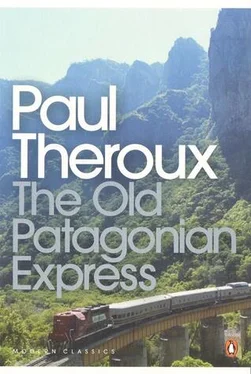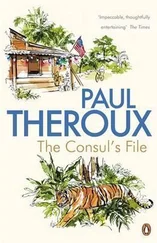Paul Theroux - The Old Patagonian Express - By Train Through the Americas
Здесь есть возможность читать онлайн «Paul Theroux - The Old Patagonian Express - By Train Through the Americas» весь текст электронной книги совершенно бесплатно (целиком полную версию без сокращений). В некоторых случаях можно слушать аудио, скачать через торрент в формате fb2 и присутствует краткое содержание. Год выпуска: 2008, Издательство: Penguin Books Ltd, Жанр: Путешествия и география, на английском языке. Описание произведения, (предисловие) а так же отзывы посетителей доступны на портале библиотеки ЛибКат.
- Название:The Old Patagonian Express: By Train Through the Americas
- Автор:
- Издательство:Penguin Books Ltd
- Жанр:
- Год:2008
- ISBN:нет данных
- Рейтинг книги:5 / 5. Голосов: 1
-
Избранное:Добавить в избранное
- Отзывы:
-
Ваша оценка:
- 100
- 1
- 2
- 3
- 4
- 5
The Old Patagonian Express: By Train Through the Americas: краткое содержание, описание и аннотация
Предлагаем к чтению аннотацию, описание, краткое содержание или предисловие (зависит от того, что написал сам автор книги «The Old Patagonian Express: By Train Through the Americas»). Если вы не нашли необходимую информацию о книге — напишите в комментариях, мы постараемся отыскать её.
The Old Patagonian Express: By Train Through the Americas — читать онлайн бесплатно полную книгу (весь текст) целиком
Ниже представлен текст книги, разбитый по страницам. Система сохранения места последней прочитанной страницы, позволяет с удобством читать онлайн бесплатно книгу «The Old Patagonian Express: By Train Through the Americas», без необходимости каждый раз заново искать на чём Вы остановились. Поставьте закладку, и сможете в любой момент перейти на страницу, на которой закончили чтение.
Интервал:
Закладка:
Where? Into that wind, that darkness, those huts in the desert. They were not changing trains — they lived in Jacobacci. Later I judged it to be a naive thought, but at the time I reflected on how strange it was that there were people — immigrants and the children of immigrants — who had chosen to live here, of all places. There was no water, no shade, the roads were terrible, and little paid employment was possible. However tough the people, they did not have the stamina and ingenuity of the Indians who, in any case, had never lived in this part of Patagonia. To the north-east were the fertile grasslands of Bahia Blanca, to the west the lakes — the Tyrolean paradise of Bariloche. For the sake of a few sheep and cattle, and a baffling stubbornness, people lived in this tiny Patagonian town, where the rail line divided, a railway junction in the desert. But it was a naive thought. Some people required space much more than they required grass or trees, and for them cities and forests were stews of confusion. You can be yourself here, a Welshman told me in Patagonia. Well, that much was true.
I left my suitcase on the platform, paced for a while and smoked my pipe. There would not be a train to Buenos Aires for three days. A Unesco poster nailed to the station wall told me about malnutrition in Latin America. As in Guatemala, a sign said Use The Train — It Is Cheaper! And another said, The Train Is Your Friend- Be A Friend of The Train! Hanging from a platform post was a bronze bell, like an old school bell. The station master had rung it just before the Lakes of the South Express had pulled out, but no one had boarded.
The train had gone in one direction, the Jacobacci passengers in another. So only I was left, like Ishmael: 'And I only am escaped alone to tell thee.' It was cold in this dismal place, but I had no choice but to wait four hours for the teeny-weeny steam train to Esquel. But I also thought: It's perfect. If one of the objects of travel was to give yourself the explorer's thrill that you were alone, that after fifteen or twenty thousand miles you had outrun everyone else and were embarked on a solitary mission of discovery in a remote place, then I had accomplished the traveller's dream. The train travels a thousand miles from Buenos Aires, stops in the middle of the desert and you get out. You look around; you're alone. It is like arriving. In itself it is like discovery — it has that singularity. The sky was full of stars in unfamiliar constellations, and even the moon was distorted, like an antipodean version of the one I was used to. This was all new. In the best travel books the word alone is implied on every exciting page, as subtle and ineradicable as a watermark. The conceit of this, the idea of being able to report it — for I had deliberately set out to write a book, hadn't I? — made up for the discomfort. Alone, alone: it was like proof of my success. I had had to travel very far to arrive at this solitary condition.
A voice, a frog-croak, said, 'Tea?'
It was the station master. He wore a winter coat and a scarf and cracked boots and had a silver General Roca Railways badge on his coat collar. The tiny gas stove in his office afforded some heat, and a small dented tea kettle rocked on an improvised wire grill.
I thought I had better explain. I said, 'I am waiting for the train to Esquel.'
' Esquel is a very nice place.'
This was the view from Jacobacci. He was the first person I had met to praise Esquel. But having seen a bit of Jacobacci I could understand why. People in Belchertown, Massachusetts, always have a good word for Holyoke.
He had packed maté leaves (they are from an evergreen tree, the Ilex) into a small cup and inserted a silver straw. The cup was bone, a cow's horn with crude ornamental writing on it.
He said, 'There is lots to do in Esquel. Hotels, restaurants. There are big farms. Go about fifty kilometres and you will find a lovely park — trees, grass, everything. Yes, Esquel is a nice place.'
He poured boiling water over the leaves and handed me the tea.
'You like it?'
'Very good. I like maté.' He had put too much sugar in it. It tasted disgusting.
'I mean, the cup.'
I looked at the cup.
'A cow's horn,' he said. 'It is from Paraguay.'
The scratches on the horn said as much. I told him I admired it.
'You have been to Paraguay?'
He shrugged. 'My wife. Her brother is there. She went there last year.' Hegrinned.'Inaplane.'
He was nodding, making another cup of tea. I asked him questions about Jacobacci, and the train, and Patagonia. His replies were not interesting. He wanted to talk about money. How much had my suitcase cost? How much was a house in the United States? What did I earn?
How much did a new car cost? By way of reply I told him how much a pound of steak cost in Massachusetts. That took his breath away. He stopped complaining and began to boast about the price of sirloin.
If only he had said, Want to hear something strange? He was old enough to know a good story. But he was half asleep, and it was cold, and nearly three in the morning. So I left him alone and went outside. I walked up the tracks, away from the lights of the station. The wind in the thorn bushes rasped like sand in a chute. The air smelled of dust. The moon on the bushes shone blue across the bumpy monotony of Patagonia.
I heard a growl. There was a low black hut about thirty yards away, andi suppose my footsteps on the gravel of the railway line had woken the dog. He began to bark. His bark woke one nearby and this nearer one yapped loudly. I have never managed to overcome my childhood fear of being bitten by a dog, and large barking dogs petrify me. There are Irish wolfhounds slavering in my worst nightmares. The most aggressive dogs are owned by old people and lovely women and ugly midget men and childless couples. He won't hurt you, say these people, enjoying my terror, and I want to say, Maybe not, but I might hurt him, In South America — the fact is well-known — many of the dogs are rabid. They are not the cowering pariahs I had seen in Ceylon and Burma, but sleeker, fangy, wolf-like creatures which were encouraged by the natives. There were always dogs in the Indian villages in Peru and Bolivia, looking much more alert than the Indians themselves. The silly things had chased the train. I was afraid of getting rabies. The cure is as bad as the disease.' It was not an irrational fear: I had seen notices warning people of the dangers of mad dogs.
One dog, smaller than his bark suggested — about the size of a satchel — pushed through the thorn bushes and hurried onto the track. He crouched and snarled, summoning the other one. I put my hands into tny pockets and started walking backwards. I glanced back at the lighted station -1 was stupid to have strayed so far. The dogs were now together on the tracks and approaching me, but warily, rushing forward and barking loudly and keeping themselves low. I looked for a stick to beat them with (would a beating madden them and make them killers, or would it drive them away?), but this was the desert. Apart from the few poplars at the station there was not a tree for hundreds of miles. I wanted to run, but I knew they would understand this as a sign of cowardice and pounce on me. I continued to walk backwards, keeping my eye on them and fearing them too much to hate them. Nearer the station I was given hope by the poplars — at least I could climb one and be safe. But there was light here, too; the light seemed to worry the dogs. They kept in the shadows, darting between the railway cars, and when they saw I was safe on the platform they chased each other. They were small, stupid, pathetic and crippled; and from my position of safety I hated them.
The station master had heard the commotion. He said, 'Don't go out there very far. There are a lot of dogs around.'
Читать дальшеИнтервал:
Закладка:
Похожие книги на «The Old Patagonian Express: By Train Through the Americas»
Представляем Вашему вниманию похожие книги на «The Old Patagonian Express: By Train Through the Americas» списком для выбора. Мы отобрали схожую по названию и смыслу литературу в надежде предоставить читателям больше вариантов отыскать новые, интересные, ещё непрочитанные произведения.
Обсуждение, отзывы о книге «The Old Patagonian Express: By Train Through the Americas» и просто собственные мнения читателей. Оставьте ваши комментарии, напишите, что Вы думаете о произведении, его смысле или главных героях. Укажите что конкретно понравилось, а что нет, и почему Вы так считаете.












